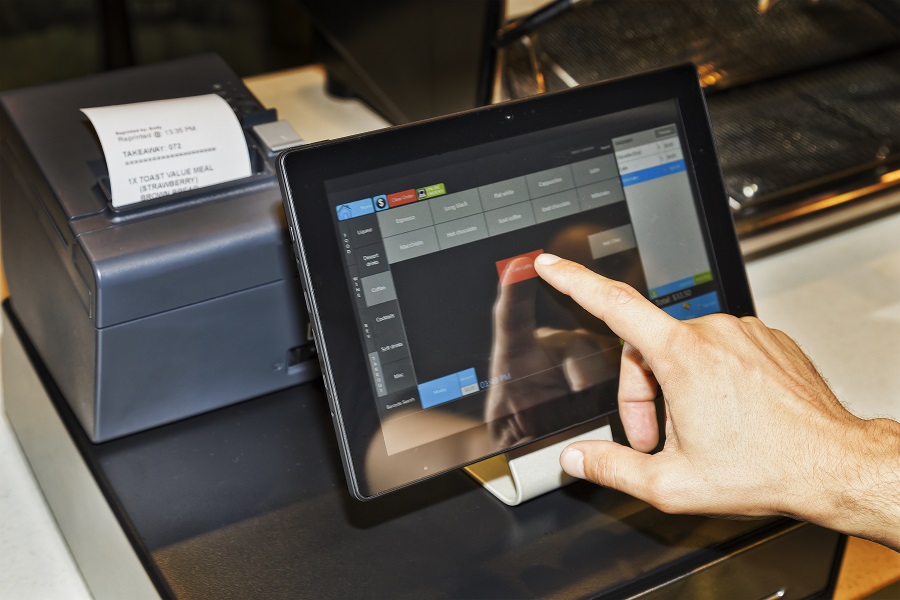08 Nov

As a retail business owner, choosing the right Point of Sale (POS) system is crucial for the success of your business operations. A POS system helps streamline all your sales transactions and provides valuable business insights. However, picking the wrong POS can be frustrating and cost you time and money in the long run. To avoid this, here are a few things to consider before you buy a POS system.
What is a POS system?
A Point of Sale (POS) system refers to an integrated software and hardware solution that facilitates sales transactions at retail establishments and manages crucial back-office operations. At its core, the best point-of-sale software allows the processing of different payment types like cash, credit cards, debit cards, gift cards, etc. seamlessly through an interactive interface. Beyond transaction execution, a complete POS manages vital business and inventory aspects as well through its robust features. This includes product and customer databases, reporting modules, employee management tools, loyalty programs, and ordering and fulfillment integrations.
More advanced and some of the best POS for retail offer diverse functionalities like customizable dashboard views, drag-and-drop interface configuration, inventory tracking at item level across locations, sales analytics, purchase order generation, ship-from-store capabilities, and mobility features through tablets and mobile applications. The integrated nature of modern POS solutions streamlines core retail workflows enhancing the overall purchase experience for customers while providing deep operational insights to owners.
With evolving technologies, new-age POS is also incorporating cutting-edge concepts like artificial intelligence, predictive analysis, computer vision, and Internet of Things (IoT) integration. All in all, a well-rounded POS acts as the digital backbone powering an optimized retail business from the shopfloor to the boardroom.
How to choose a POS system for your retail business?
Know Your Needs
The first step is figuring out your business needs. Consider the following factors:
Number of employees and locations: If you have multiple stores, you’ll need an enterprise POS system that supports multi-store operations. Whereas, a sole proprietorship may only need a basic POS.
Payment methods: Decide if you need to accept credit/debit cards, mobile payments, gift cards, etc. Choose a system that supports all required payment modes.
Inventory management: Do you need a system to manage product catalogs, track inventory levels, generate purchase orders, etc.? Online inventory integration also helps with seamless ordering.
Analytics and reporting: Data-driven insights help improve decision-making. Check if the POS offers robust reporting on sales, customers, employees, etc.
Customization and integration: Evaluate integrations with accounting, loyalty programs, and other essential software. A flexible system lets you customize features over time.
Understanding your current and future needs helps shortlist the best POS systems for retail actually relevant to your business. Don’t overload yourself with unnecessary features just for the sake of it.
Also Read: POS Systems in Retail Business
Consider Budget
POS systems come with a variety of price points. Know your budget for both hardware (cash registers/tablets) and ongoing monthly or annual software fees. Do research to choose a cost-effective option. Furthermore, also factors in additional costs like payment processing, support packages, etc.
Some POS providers offer small business packages with bundled hardware-software solutions at affordable pricing. However, cheaper POS may lack the features of more expensive premium systems. Balance the budget with the functionality required.

Demo and Trial Periods
Once you shortlist 2-3 options based on needs and budget, request live demos from vendors. See how intuitive the software interface is and get a feel of various features. Also, check compatibility with your devices.
Most reputed POS companies provide trial periods of 15-30 days. Utilize this risk-free period to test the system in real business operations before making the purchase. It is the best way to understand any glitches or shortcomings.
Get demo support from the vendor to resolve issues during the trial. Their assistance evaluates post-sales service quality as well. Avoid systems that don’t offer trials or have unsatisfactory support.
Reviews and Ratings
To get unbiased feedback, research online reviews from existing customers of different POS providers. Study complaints and praises regarding software performance, reliability, updates, and customer service.
Similarly, check ratings on third-party review sites like Capterra and G2 Crowd. This reveals how a system fares against competitors as per real users. Reviews are honest indicators of the long-term viability of a POS investment.
Also Read: How do Customer Reviews Increase Retail Sales?
Support and Updates
Continued product support and regular upgrades are essential for any technology solution. Inquire about the support channels, average response time, and resolution procedures from POS companies.
Also, ask about the frequency of new software version releases. Frequent updates ensure your system doesn’t become outdated in a few years. Reliable long-term support helps get the most value from your investment.
Security and Data Protection
With increasing cyber crimes, data security should be a top priority. Check if the POS complies with PCI payment security standards. Opt for systems ensuring encrypted storage and transmission of sensitive customer information. Offline backup and disaster recovery capabilities also offer extra protection against data loss or theft.
Customization Capabilities
While common features are a must-have, differentiation sometimes lies in customization. Inquire about capabilities to modify the interface, create custom reports, integrate unique payment flows, etc. This empowers catering the POS exactly to your business processes over the long run.
Third-Party Integrations
Ready integrations with accounting software, shipping/fulfillment platforms, CRM, and numerous other ecosystem solutions offer seamless workflows. Some POS systems have restrictive policies on integrations. Verify integrations required for your multi-channel operations are well supported.
Mobility Features
As buying habits evolve, having a mobile POS allows serving customers across all touchpoints. Check for native apps, tablet configuration, inventory check from anywhere, wireless/Bluetooth peripherals, and tools that lift operational efficiency on the go.
Service Commitments
Beyond free trials, evaluate commitments like hardware replacement policies, long-term software licensing options, prompt response SLAs, and roadmaps for continual enhancements. Such assurances provide stability for technology integrating with core business functions.
Choosing the Right POS System
Evaluating features, budget, trial runs, reviews, and support aspects help narrow down to 1-2 ideal point-of-sale solutions fit for your specific needs. Do thorough due diligence and remember – a POS is a long-term decision.
Pick a flexible, feature-rich, user-friendly, reliable, and reasonably priced system. Also choose a vendor with 24/7 support, regular upgrades, and positive customer reviews. This sets you up for success with points of sales now and in the future as your business grows!
To take the stress out of your POS selection, request a personalized demo today. Our experts will showcase how Hana Retail streamlines operations, improves customer service and helps maximize profits for long-term success. You can sign up FREE for the best point-of-sale system for retail today!





